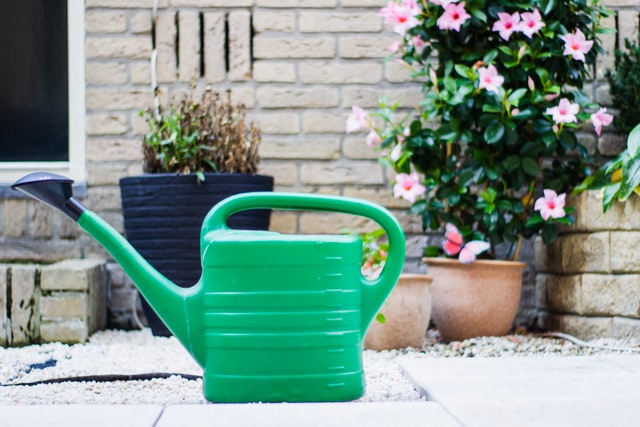A Landlord’s Guide to Garden Maintenance
Published on May 31, 2021 by Sarah Mac

With so much time being spent at home over the past year, gardens have become one of the most desirable features of a rental property. Tenants have never appreciated outdoor space more, but the question of who is responsible for what in terms of garden maintenance is one that raises many disputes between landlord and tenant.
It’s important therefore that landlords are clear on where they stand on the subject, and make themselves aware of tenants’ rights on making changes to a garden too.
Who is responsible for garden maintenance in a rental property?
Traditionally, the issue over who should be doing what in terms of garden maintenance in a rental property has been a bone of contention. But this is usually because responsibilities are not clearly laid out at the start of the tenancy. Some time spent setting things out will help to avoid time consuming disputes and confusion down the line.
Making it clear as to what a tenant is allowed to do in a garden and what their maintenance responsibilities are is essential, as is clarifying what is classed as neglect and how this will be dealt with. It’s also important to set out which aspects of maintenance the landlord should take care of.
What are a tenant’s garden maintenance responsibilities?
Most tenancy agreements will state the tenants should carry out basic garden maintenance. This would usually include:
- Keeping the garden clear of litter and other debris, such as fallen branches
- Maintaining a reasonable standard of orderliness, e.g. basic pruning and weeding
- Regular lawn mowing and weeding
- Watering plants and lawns
End of tenancy
When the tenancy is over, tenants are expected to return a garden in the same condition it was at the start. Landlords cannot expect tenants to improve the look of a garden, only to keep it as it was.
Specialist tasks
It is not reasonable to expect tenants to carry out tasks that call for any form of knowledge or expertise. Tasks such as tree pruning or erecting fencing for example will need to be done by professionals and landlords should make the arrangements and cover the costs of any work that needs to be done in order to maintain a safe and secure environment for the tenant.
Garden usage
In terms of what tenants are allowed to do in a rental property garden, socialising is usually permitted. Some landlords however do choose to outlaw such activities, or put limits on specifics such as parties involving loud music, or barbeques, in order to keep the peace with neighbours. Any such terms will need to be included in the tenancy agreement.
Making changes to a garden
Sometimes, especially if they’ve been inspired by a TV gardening programme, tenants will harbour a desire to make changes or improvements to a garden. This might include landscaping work such as patios and decking; adding permanent planting features; laying a synthetic or natural lawn; erecting a pergola or creating a water feature.
In such cases, permission must be sought from the landlord, with detailed plans provided for approval. If a tenant goes ahead and makes changes of this nature to a garden without permission, then the landlord would be within their rights to demand the garden to be returned to its original state, at the tenant’s cost.
What are a landlord’s garden maintenance responsibilities?
It is down to the landlord to take care of the likes of pruning trees or hedges, maintaining fencing and carrying out repairs to things like decking or paving.
Gardeners
Landlords who have properties with substantial sized gardens will usually hire the services of a gardener for regular maintenance. Where a tenant is in agreement, a clause can be added to the tenancy agreement to make an additional charge for a gardener. But if a promise is made to supply a gardener, then the landlord will be required to stick to that throughout the tenancy.
Responding to issues
Tenants should be advised to report any issues that are posing a risk in the garden, and landlords have a responsibility to respond in good time and take action where required.
How to avoid landlord-tenant garden maintenance disputes?
Factoring the costs of dealing with garden damage or neglect into the deposit is a wise move, especially if the property has a particularly large or attractive outdoor space.
If you allow pets, you may wish to make special provision for a pet-friendly garden or dedicated area of the garden for them to use. You may also wish to review the level of deposit in this respect.
Clearly setting out respective responsibilities within the tenancy agreement is also helpful, as is confirming how the garden can be used, and any outlawed activities, so that the tenant knows where they stand from the outset.
At the beginning of the tenancy, an inventory and check-in report, complete with date stamped photographs, will provide valuable evidence of the condition of the garden when the tenant moves in, so that it can be compared to how it looks at the end of the tenancy.
Regular mid-term inspections help landlords keep track of the condition of the garden, and the rest of the property. They allow for any developing issues to be identified so they can be taken care of early on, and any signs of neglect spotted and dealt with.
Finally, be sure to arrange adequate buildings insurance to cover any malicious or accidental damage by tenants or their visitors.
Need a detailed, unbiased property inspection? Talk to S.R.P. Inventories.
Looking for an inventory, check-in, check-out or mid-term inspection you can rely on to support you in a deposit scheme dispute? Here at S.R.P. Inventories, our services have been trusted for over a decade by landlords, property agents and housing associations.
To learn more about how we can help you protect your property and for our latest competitive rates, please get in touch.

